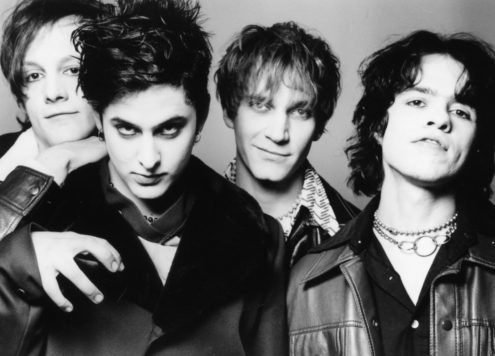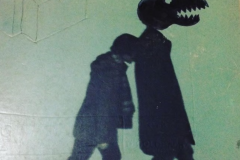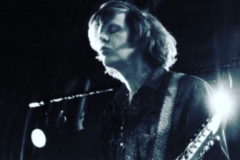On December 9, 25 years since the band’s formation, Brooklyn’s The Bell House will host a tribute concert honoring the legendary Dayton, Ohio band Brainiac whose career was cut short after the untimely death of frontman Tim Taylor. The concert will feature performances by Girls Against Boys, Savak and The Heist (The 8G band from the late show with Seth Meyers featuring: Eli Janney, Seth Jabour, Syd Butler, Marnie Stern and Matt Schulz). Special guests will also include Melissa Auf der Maur, Gregg Foreman, Tim Harrington, Travis Morrison, Peter Aaron and Charles Bissell (tickets are available here).
This incredibly special night will be filmed for the upcoming feature-length documentary on the band by Dayton native and Brooklyn based filmmaker Eric Mahoney. Mahoney’s documentary and narrative works have been seen on national television and at various international film festivals such as Cannes and Tribeca. His latest project MADLY will be out on VOD this fall.
To date the project features interviews from the surviving band members (John Schmersal, Tyler Trent, Michelle Bodine and Juan Monasterio), the Taylor family and a slew of musicians including: Steve Albini, Wayne Coyne, Buzz Osbourne, Cedric Bixler, David Yow, Eli Janney, Fred Armisen, Melissa Auf Der Maur, Jim O’Rourke and many more.
In the ’90s the Dayton music scene began generating worldwide buzz from bands such as The Breeders and Guided by Voices. Arguably the most innovative of them all, however, was Brainiac, led by musical genius and the insanely charismatic Taylor. After several singles, the band signed to NYC label Grass Records and recorded two seminal albums (Smack Bunny Baby and Bonsai Superstar) with Girls Against Boys own Eli Janney at the helm. Countless tours and much critical acclaim came which landed the band on the Lollapalooza tour and a deal with Touch and Go Records. The band released a full length (Hissing Prigs In Static Couture) and two EPs on the label using producers Eli Janney, Steve Albini, Kim Deal and Jim O’Rourke.
Brainiac had just concluded a tour with Beck and was slated to sign a major label record deal when Taylor was tragically killed in an auto accident. While Taylor has passed, the impact of Brainiac’s music has not. Over the past two decades, their music has gone on to influence the likes of Nine Inch Nails, The Mars Volta, Death Cab For Cutie and countless others.
Ghettoblaster recently caught up with Mahoney to discuss both the documentary project and the lasting impact of the band.
When did you first start thinking a Brainiac documentary was something you’d like to pursue?
For years probably. I’ve always wanted to do a trilogy or beyond about Dayton. The funk history is something that interests me a lot. The history of innovation in Dayton and the musicality of the town is something that has always interested me being a native of that city. And I’ve always been a massive Brainiac fan, since high school, so it has always been on the backburner as something I wanted to explore someday.
I finished up a film that I was producing that was part of the festival circuit last year and once I wrapped that up I was looking at new projects and realized it was 20 years since Tim Taylor had passed away and thought that maybe this would be the year that it would be appropriate to explore that. So last December I started reaching out to those guys and taking the temperature in terms of whether they’d be interested in it.
It is something that I’ve always been interested in and it is coming up on a year now that I’ve been investigating it. Sadly, that music was so incredibly influential and creative and the tragedy of Tim’s passing…it didn’t get to reach as many people as it should have. I’m hoping that this, in some tiny way, puts it on the radar of some younger musicians and music fans.
How daunting was it for you to think about telling this story without the benefit of being able to ask Tim about his experience?
The whole thing has been daunting. And the deeper I’ve gotten into this with his mom and family and bandmates, the sensitivity of this and the weight of being able to tell this story is not insignificant to me. I feel like I’ve done a lot of interviews at this point and I think we’ve gotten a good picture of who he was as an artist and as a person and that we’ll be able to convey that in the film. But yeah, I think that is always in the back of my mind, doing justice to this and doing the right thing by Tim.
In a lot of ways, this is his story. It is the story about a band foremost, but he was at the center of that. It is something that I’m always wrestling with. It is hard not to talk to the principle songwriter, but you can talk to his producers, to the family, to his close friends, his bandmates and start to get a sense of who he was pretty well.
What was the experience of speaking with Tim’s mom like?
I can say that I’m immensely appreciative of her participation, from our initial conversation through today. It was fascinating to get the deep history from both her side of the family and from his father Terry’s side of the family as to where Tim has come from. There is a very rich musical history that goes up both sides of that lineage. To hear her talk about her own…she’s a cello player and Terry was an accomplished jazz musician. To hear about the house he was raised in around music was tremendously enlightening in terms of where this artist blossomed from. She’s been incredibly supportive.
Another thing that I’ve heard from her, his family, and the band as well, is that doing this film has been cathartic for all of them. That has really touched me. I didn’t know that providing any kind of catharsis for the people closest to him would be a byproduct of this. This loss is so much bigger than the loss of a musician. To lose a child is the worst loss that anyone can probably go through. The loss of the music is probably far down on the list for those closest to Tim. That aspect has been really moving to me and makes me really want to work harder and to do right by them first and foremost. I appreciate the level of trust they’ve given me. That means a lot. To sit down and get that rich history was such a gift.
I’ve also asked the band members about how they coped with this very layered tragedy in their 20s. They lost a brother, they lost their career, they lost their identity and in a lot of ways, when you are in a band and you are on tour you are in sort of a suspended state of adolescence. It’s not a ground life. It is a bizarre world. So you’re floating along, but you are also working very hard, and those guys were laser-focused, and they had a major label contract on the table that was about to be executed. Then to have it all stripped away is so tragic, sad, complicated and life-changing. So we explore how they’ve dealt with that over the last twenty years too. How does one cope with that kind of loss that not only leaves you without a best friend or bandmate, but that also strips you of your identity. It is Shakespearian-level tragedy. It is a life-altering, dark thing to tackle as a young person.
How do you not become a casualty of that?
Yeah, absolutely. That’s a tall order to have to move on and grow from. It’s a testament to their fortitude.
Have you been shocked and surprised at how far of a reach they had with their peers at the time and even now?
I’ve always been aware of [higher profile] fans of theirs as a fan myself. I think that for musicians, Brainiac is not an unheard of band. The ‘secret group’ of fans so to speak are players. They were so interesting. Tim’s musicality was so deep and enriching, from his jazz background…if anyone has found them over the last two decades, it has been musicians. In terms of music fans, that’s where they may have gotten lost a little bit. But people who have made their life’s work writing and performing music have sought them out and found them because of their timelessness, innovation, and complete, utter originality. That doesn’t surprise me.
I just got word that The National were big fans. It doesn’t surprise me. Musicians know about them and have probably been borrowing things from them for years and years and years.
Were you ever worried that you weren’t going to reach your goal with the crowdfunding?
Yeah.
Were you shocked that you did?
No. I had a gut feeling that was the right amount. That covered production and shooting in a half-dozen cities, getting 20 interviews in the can, paying all the crews, travel, all that kind of stuff. Now I’m looking for post-production funding, licensing fees, editor, sound mix, color direction, all that kind of stuff.
How hard is it to sell a story like this to an outside investor? What does the ideal investor for this look like?
It looks like, literally, anyone who will write me a check [laughter]. Frankly, this isn’t a film that is going to turn on an investor who is investing in films to make money. This is a passion project about a band that 99 percent of the population has not heard of. They have a rabid cult following, the story is fascinating, their music is genius and should be shared as far and wide as possible.
I get it. I totally get it. In many ways, it is a niche film. So it is tough. I’m looking for an angel investor to come in and get us over the finish line here. I’ve not paid myself to work on this and I have an editor who plays in a band called Monograms here in Brooklyn who has been donating his time because he feels strongly about it as well. It has taken a village of people and goodwill to push this through. I’m tremendously in debt to the people who contributed to the Kickstarter so that we could get this up and running and go get some interviews in the can. That was a real blessing.
What’s the idea and concept behind the Bell House show?
What I wanted to do with the tribute show was to bring the music into the present and show that this music is still being celebrated in modern times. I wanted to bring some celebratory and positive footage into the film, because this film has a tremendous level of tragedy to it. That’s not the angle I wanted to go for. I don’t want the people who see this to walk out of the film bummed out. I’m trying to construct a way to come up for air here in the piece and show that people have moved on, but are still very much connected to the music. I wanted to have a night where all the musicians who contributed to the film were invited, where friends and fans could play. I’m going to film it, we’ll have backstage interviews, and it will be a good opportunity to get a lot of footage in one night.
Is the timeline for finishing the film still up in the air at this point?
It is a little up in the air. It is budget dependent. It will be done next year, I can say that. Come hell or high water we’ll get it done next year.
Will there be a Dayton showing of the movie?
For sure. We’ll probably do a premiere at the Neon. Warped Wing Brewery has reached out to us and wants to do a special run of Brainiac beer to coincide with the release, so we’ll probably do something with them in collaboration with the Dayton premiere. It is very important to me to have a proper premiere in Dayton and to have a proper run, and to get as many people out to participate, have some Q and As, that kind of stuff.
Follow the documentary here: Instagram | Facebook










Social Media